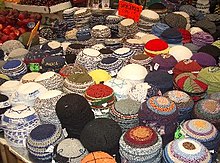Kippah
| Part of a series on | |||
|---|---|---|---|
| |||
| Judaism | |||
| Category | |||
| Jewish religious movements | |||
| Jewish philosophy | |||
| Religious texts | |||
| Religious Law | |||
|
Kashrut • Tzniut • Tzedakah • Niddah • Noahide laws | |||
| Holy cities | |||
| Important figures | |||
| Rabbinic sages | |||
| Jewish life cycle | |||
| Religious roles | |||
|
Rabbi • Rebbe • Posek • Hazzan/Cantor | |||
|
Dayan • Rosh yeshiva • Mohel • Kohen/Priest | |||
| Religious buildings & institutions | |||
| Jewish education | |||
| Religious articles | |||
|
Sefer Torah • Tallit • Tefillin • Tzitzit • Kippah | |||
| Jewish prayers and services | |||
| Judaism & other religions | |||
| Abrahamic faiths | |||
| Related topics | |||
A kippah (Hebrew) or yarmulke (Yiddish) is a small cloth cap worn by Jews. Traditionally it was worn only by men, but in modern times the push for equality between the sexes in the practice of Judaism has led some women to wear yarmulkes. Some Jews only wear yarmulkes while praying; others wear yarmulkes the entire day, making sure not to walk more than four cubits without head covering (especially outside). The basis for wearing a head covering is a story in the Talmud (tractate Shabbat).


Often, the color and fabric of the yarmulke can be a sign of adherence to a specific religious movement. The Israeli National Religious community is often referred to by the name kipot srugot כיפות סרוגות, literally "woven yarmulkes". Similarly, some Haredi sects are referred to by the name kipot shkhorot כיפות שחורות, which means’s
"black yarmulkes".

Etymology
changeThe etymology of yarmulke is unclear. Linguists (e.g. Max Vasmer) maintain that the Yiddish word is derived (via Russian or Polish) from the Turkic yağmurluk, meaning 'raincoat'.
Traditionally, yarmulke is considered to have originated from the Aramaic phrase "yarei mei-elokah" (in awe of the Lord), in keeping with the principle that the yarmulke is supposed to reflect someone's fear of heaven. Or perhaps, "yira malkah" (fear of the King).

